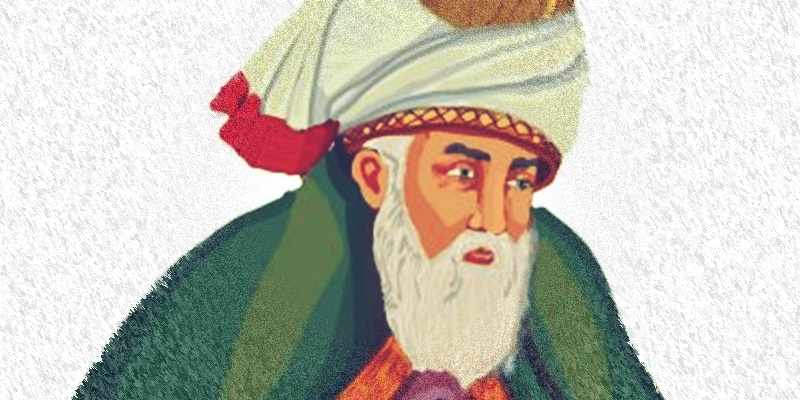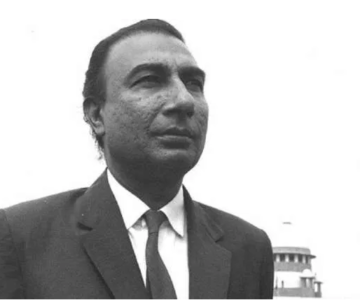Sunlight has recently offered two versions/translations of Rumi’s Mathnawi story of the dervish Bayazid Bestami
~~~~~~~~~~~~~~~~~~~~~~~~~~~~~~~~~~~~~~~~~
BESTAMI
That magnificent dervish, Bayazid Bestami,
came to his disciples and said,
“I am God.”
It was night, and he was drunk with his ecstasy.
“There is no God but me. You should worship me.”
At dawn, when he had returned to normal,
they came and told him what he’d said.
“If I say that again,
bring your knives and plunge them into me. God
is beyond the body, and I am in this body.
Kill me when I say that.”
Each student then sharpened
his knife, and again Bayazid drank the God-Wine.
The sweet dessert-knowing came. The Inner Dawn
snuffed his candle. Reason, like a timid advisor,
faded to a far corner as the Sun-Sultan
entered Bayazid.
Pure spirit spoke through him.
Bayazid was not there. The “he” of his personality
dissolved. Like the Turk who spoke fluent Arabic,
then came to, and didn’t know a word.
The Light of God poured into the empty Bayazid and became words.
Muhammed did not dictate the Qur’an. God did.
The mystic osprey opened its wings in Bayazid
and soared.
“Inside my robe
there is nothing but God.
How long will you keep looking elsewhere!”
The disciples drew their knifes and slashed out
like assassins, but as they stabbed at their Sheikh,
they did not cut Bayazid. They cut themselves.
There was no mark on that Adept,
but the students were bleeding and dying.
Those who somewhat held back, respecting their Teacher,
had only lightly wounded themselves.
A selfless One disappears into Existence and is safe there.
He becomes a mirror. If you spit at it,
you spit at your own face.
If you see an ugly face there, it’s yours.
If you see Jesus and Mary, they’re you.
Bayazid became nothing,
that clear and that empty.
A saint puts your image before you.
When I reach this point, I have to close my lips.
Those of you who are love-drunk on the edge of the roof,
sit down, or climb down. Every moment spent in Union
with the Beloved is a dangerous delight,
like standing on a roof-edge.
Be afraid up there,
of losing that connection, and don’t tell anybody
about it. Keep your secret.
— Mathnawi IV: 2102-2148
Version by Coleman Barks
“Delicious Laughter”
Maypop, 1990
~~~~~~~~~~~~~~~~~~~~~~~~~~~~~~~~~~~~~~~~~
The story of Bayazid’s – may God sanctify his spirit- saying, “Glory
to me! How grand is my estate!” and the objection raised by his
disciples, and how he gave them an answer to this, not by the way
of speech but by the way of vision (immediate experience).
That venerable dervish, Bayazid, came to his disciples, saying,
“Lo, I am God.”
That master of the (mystic) sciences said plainly in drunken
fashion, “Hark, there is no god but I, so worship me.”
When that ecstasy had passed, they said to him at dawn,
“Thou saidest such and such, and this is impiety.”
He said, “This time, if I make a scandal, come on at once and
dash knives into me.
God transcends the body, and I am with the body: ye must
kill me when I say a thing like this.”
When that (spiritual) freeman gave the injunction, each
disciple made ready a knife.
Again he (Bayazid) became intoxicated by that potent flagon:
those injunctions vanished from his mind.
The Dessert came: his reason became distraught. The Dawn
came: his candle became helpless.
Reason is like the prefect: when the sultan arrives, the help-
less prefect creeps into a corner.
Reason is the shadow of God: God is the sun: what power
hath the shadow to resist His sun?
When a genie prevails over (gains possession of) a man, the
attributes of humanity disappear from the man.
Whatsoever he says, that genie will (really) have said it: the
one who belongs to this side will have spoken from (the control
of) the one who belongs to yonder side.
Since a genie hath this influence and rule, how (much more
powerful) indeed must be the Creator of that genie!
His (the possessed man’s) “he” (personality) is gone: he has
in sooth become the genie: the Turk, without (receiving) Divine
inspiration, has become a speaker of Arabic*.
When he comes to himself, he does not know a word (of
Arabic). Inasmuch as a genie hath this essence and quality,
Then how, pray, should the Lord of genie and man have in-
feriority to the genie?
If a pot-valiant fellow has drunk the blood of a fierce lion, you
will say that the wine did it, not he;
And if he fashion words of old (pure) gold*, you will say that
the wine has spoken those words.
A wine hath this (power to excite) disturbance and com-
motion: hath not the Light of God that virtue and potency
To make you entirely empty of self, (so that) you should be
laid low and He should make the Word lofty (within you)?
Though the Qur’an is (dictated) from the lips of the Prophet
if any one says God did not speak it, he is an infidel.
When the huma of selflessness took wing (and soared),
Bayazid began (to repeat) those words.
The flood of bewilderment swept away his reason: he spoke
more strongly than he had spoken at first,
(Saying), “Within my mantle there is naught but God: how
long wilt thou seek on the earth and in heaven?”
All the disciples became frenzied and dashed their knives at
his holy body.
Like the heretics of Girdakuh, every one was ruthlessly*
stabbing his spiritual Director.
Every one who plunged a dagger into the Shaykh was re-
versely making a gash in his own body.
There was no mark (of a wound) on the body of that possessor
of the (mystic) sciences, while those disciples were wounded and
drowned in blood.
Whoever aimed a blow at his throat saw his own throat cut,
and died miserably;
And whoever inflicted a blow on his breast, his (own) breast
was riven, and he became dead for ever;
And he that was acquainted with that (spiritual) emperor of
high fortune, (and) his heart (courage) did not consent to strike
a heavy blow,
Half-knowledge tied his hand, (so that) he saved his life and
only wounded himself.
Day broke, and the disciples were thinned: wails of lamenta-
tion arose from their house.
Thousands of men and women came to him (Bayazid), saying,
“0 thou in whose single shirt the two worlds are contained,
If this body of thine were a human body, it would have been
destroyed, like a human body, by the daggers.”
A self-existent one encountered a selfless one in combat: the
self-existent one drove a thorn into his own eye (hurt himself).
0 you who stab the selfless ones with the sword, you are
stabbing your own body with it. Beware!
For the selfless one has passed away (in God) and is safe: he is
dwelling in safety for ever.
His form has passed away and he has become a mirror:
naught is there but the form (image) of the face of another.
If you spit (at it), you spit at your own face; and if you strike
at the mirror, you strike at yourself;
And if you see an ugly face (in that mirror), ’tis you; and if
you see Jesus and Mary, ’tis you.
He is neither this nor that: he is simple (pure and free from
attributes of self): he has placed your image before you.
When the discourse reached this point, it closed its lips; when
the pen reached this point, it broke to pieces.
Close thy lips (0 my soul): though eloquence is at thy com-
mand, do not breathe a word and God best knoweth the right
way.
0 you who are drunken with the wine (of love), you are on
the edge of the roof: sit down or (else) descend, and peace be
with you!
Every moment when you enjoy (union with the Beloved),
deem that delightful moment to be the edge of the roof.
Be trembling for (fear of losing) the delightful moment: con-
ceal it like a treasure, do not divulge it.
Lest calamity suddenly befall (your) plighted love, take heed,
go very fearfully into that place of ambush.
The spirit’s fear of loss at the moment of enjoyment is (the
sign of its) departure (descent) from the hidden roof-edge.
If you do not see the mysterious roof-edge, (yet) the spirit is
seeing, for it is shuddering (with fear).
Every sudden chastisement that has come to pass has taken
place on the edge of the turret of enjoyment.
Indeed there is no fall except (on) the edge of the roof: (take)
warning from (the fate of) the people of Noah and the people of
Lot.
— “The Mathnawi of Jalalu’ddin Rumi”
Edited and translated by Reynold A. Nicholson
Volume IV, verses 2102-2154
Published by “E.J.W.Gibb Memorial”,
Cambridge, England.
First published 1926, Reprinted 1990.
Nicholson’s notes:
* “if he fashion words of old (pure) gold”:
I.e. “if he speak with perfect eloquence.”
* “like the heretics of Girdakuh”: The Assassins.
* “every one was ruthlessly stabbing his spiritual Director”:
Literally, “without distress or fatigue.”



